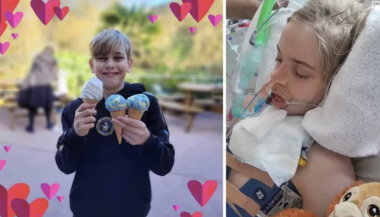Archie Battersbee's family win appeal in life support case

The family of Archie Battersbee have won their appeal against a decision to withdraw the 12-year-old's life support.
In a hearing on Wednesday, the Master of the Rolls, Sir Geoffrey Vos, the President of the Family Division, Sir Andrew McFarlane, and Lady Justice King concluded that the High Court was wrong to determine that Archie was dead.
The case will now go back to the High Court where it will be heard on 11 July.
The Christian Legal Centre (CLC), which is supporting Archie's family, said it returns to the High Court "with the understanding that Archie remains alive".
CLC chief executive Andrea Williams, said: "The ruling shows the critical importance of never giving up.
"In these difficult moments, nerves and principles are important. This judgment upholds life and will protect many more people from a slippery slope in which the legal definition of death is expanded.
"Where there's life, there's hope. We keep praying that Archie will be able to recover, given more time."
Archie was found unconscious in his home with a ligature around his neck in April. The incident is believed to have been a tragic accident.
He is on life support at the Royal London Hospital where doctors argue that it is "highly likely" that he is brain dead and want to stop treatment.
Earlier this month, the High Court approved their request, saying that on the balance of probabilities Archie was dead.
His family disagree and say that Archie should be given more time to recover.
Giving expert evidence during the High Court hearing, paediatric neurologist Professor Alan Shewmon said it was "absolutely not" the case that there was sufficient evidence to make a reliable diagnosis of death in this instance.
In submissions heard at the High Court, Bruno Quintavalle, legal counsel for Archie's parents, argued that a court declaration of death without a brain stem test confirming this would effectively expand the legal definition of death and in doing so, "trespass on Parliament's authority."
"That the court should declare, in the absence of any certainty, that death has occurred is an extremely serious issue," he said.
"If he is declared dead but actually isn't dead, the consequences couldn't be more grave.
"If someone is alive when organs are harvested (for donation), then that act of removing a beating heart will kill them."











